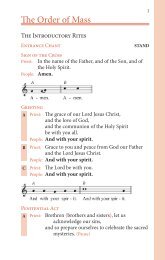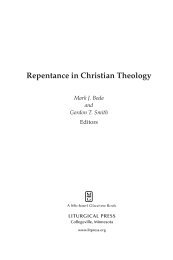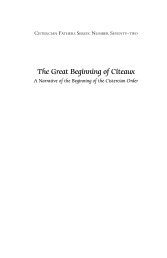“Fritz West, himself a methodological master of ... - Liturgical Press
“Fritz West, himself a methodological master of ... - Liturgical Press
“Fritz West, himself a methodological master of ... - Liturgical Press
You also want an ePaper? Increase the reach of your titles
YUMPU automatically turns print PDFs into web optimized ePapers that Google loves.
hypotheses for reconstructing the evolution <strong>of</strong> liturgy on the supposition<br />
that other liturgies might have behaved in the same way in cases<br />
where the evidence to prove it is lacking. All <strong>of</strong> the humanistic and social<br />
sciences like history, sociology, political science, and criminology<br />
depend on comparative studies and the generalizations that emerge<br />
from them. Generalizations based on observation, analysis, and comparison<br />
are so fundamental to all humanistic studies that to challenge<br />
them is simply absurd. Just imagine what would happen to art history<br />
if comparison were to be banished! I hold the same to be true for<br />
Liturgiewissenschaft.<br />
ARE BAUMSTARK’S “LAWS” LAWS?<br />
A river <strong>of</strong> ink has been spilt over Baumstark’s use <strong>of</strong> the term “the<br />
laws <strong>of</strong> liturgical evolution,” the product <strong>of</strong> an era when one still believed<br />
in the complete objectivity <strong>of</strong> the scientific method as applied<br />
to the natural sciences. “Laws” says much more than one would say<br />
today, long after Gadamer and company laid to rest the myth <strong>of</strong> absolute<br />
scientific objectivity, and Baumstark could have saved us considerable<br />
grief had he limited his metaphor to comparative philology or<br />
linguistics. But it is a complete distortion <strong>of</strong> his thought to seize out <strong>of</strong><br />
context his metaphors <strong>of</strong> the natural sciences and biology as indicating<br />
that he confused the laws <strong>of</strong> nature with the flow <strong>of</strong> history. This is<br />
clear enough from his assertion that “historical facts ought never to be<br />
absent from the mind <strong>of</strong> the historian <strong>of</strong> Liturgy. Further, Comparative<br />
Liturgy should always be on its guard against preconceived ideas and<br />
above all against theories constructed (in the way dear to theologians)<br />
in the interests <strong>of</strong> a system” (CL 7).<br />
Baumstark’s abhorrence <strong>of</strong> preconceived ideas <strong>of</strong> the sort common<br />
to the manual theology <strong>of</strong> his day, which began with the conclusion<br />
and then marshalled the arguments that agreed with it, may be the<br />
reason for Baumstark’s insistence that Comparative Liturgy is a<br />
science. For he continues, “This maxim follows from the place we assign<br />
to Comparative Liturgy in the totality <strong>of</strong> the sciences,” then goes<br />
on to explain what he means by the example <strong>of</strong> the Anaphora <strong>of</strong> Addai<br />
and Mari and another Mesopotamian anaphoral fragment, which lack<br />
the words <strong>of</strong> institution (CL 8). For Baumstark, such phenomena are<br />
facts to be taken at face value and not to be explained (or explained<br />
away) in function <strong>of</strong> some doctrine about the place <strong>of</strong> the Verba Domini<br />
in the eucharistic consecration (CL 7–8). So Baumstark’s heuristic<br />
principles are “laws” only in the metaphorical sense, no more than<br />
xxii






